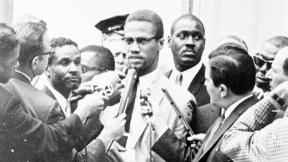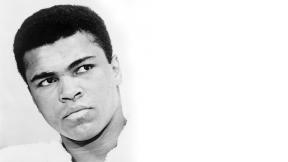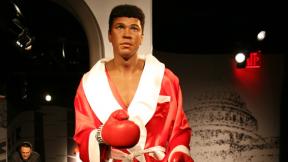
Muhammad Ali cared deeply for Muslims, the Ummah, as well as all of humanity. He stood up for the people of Vietnam; he worked to stop genocide in Bosnia; he marched for Palestine, and he helped release American hostages.
Globalization brings humanity closer, whereas the post-9/11 overemphasis on “American” Islam leads to confusion by intentionally creating a distance among human beings.
Muhammad Ali refused to be defined by identity politics that demand Muslims answer the wrong question: Are you American first or Muslim first?
He was often asked: Are you Cassius or Muhammad Ali? His answer was very clear: Muhammad Ali, because one’s name doesn’t define their loyalty to their country. Muhammad Ali, being a first class American and a first class Muslim, had no problem speaking truth. For this, he made substantial sacrifices.
“I am Muhammad Ali, a free name – it means beloved of God, and I insist people use it when people speak to me,” declared Muhammad Ali in 1964.
While Muhammad Ali fought for his name so proudly, almost 30% Muslim children in America today avoid using Muslim names in public schools due to Islamophobia and rising bullying. Unfortunately 20% of this bullying is done by “teachers.”
Muhammad Ali & the Vietnam War
“They did what they thought was right, and I did what I thought was right." - Muhammad Ali.
In 1966, two years after winning the heavyweight boxing title, Muhammad Ali challenged America and the country’s establishment on our involvement in the Vietnam war. He refused to be enlisted in the U.S. military, since invading and killing people was against his moral and religious conscience. As a result, he lost four precious years of his prime performance as an athlete.
Muhammad Ali was ahead of others. He was condemning the Vietnam war before Dr. Martin Luther King’s historic Riverside Church speech which was given exactly one year before Dr. King was assassinated. In it, he criticized war at home, i.e. racism, and war abroad, i.e. Vietnam.
“Why should they ask me to put on a uniform and go ten thousand miles from home and drop bombs and bullets on brown people in Vietnam while so-called Negro people in Louisville are treated like dogs and denied simple human rights?” - Muhammad Ali
I first met Muhammad Ali In June 1977, exactly forty years ago, while visiting from Pakistan. I attended a reception by the Mayor of Chicago in honor of Imam Warith Deen Mohammed, who had moved away from the extreme rhetoric of the Nation of Islam and led thousands of African-Americans to mainstream Islam.
We were both late for the reception and left standing next to each other before seats could be found for us. There, someone asked if I knew the person beside me. I glanced and couldn’t recognize him. Then I looked again and I couldn't believe my eyes. It was Muhammad Ali, the champion who made us laugh and cry all around the world.. I had only ever seen him during one of his matches on a black and white television in Pakistan, but never in a suit.
How Muhammad Ali helped stop genocide in Bosnia
As the genocide of Bosnian Muslims raged in the early 1990s, the horrifying images of Serb concentration camps, so much like the Nazi ones fifty years before, haunted us. Yet, the world remained silent. Leaders of Chicago’s Masjids at the time invited me to lead a coalition to stop this madness.
This was how Bosnia Task Force USA (BTF) was born. It became the first, national-level coalition of Muslim organizations of its kind in America. BTF was based out Sound Vision’s small office, with one full-time staff person, along with a few volunteers.
One of the first steps we took was to send a delegation of American Muslim leaders to the United Nations. One problem was that there was no significant, attention-grabbing name in the delegation which might result in bringing attention to the issue. I approached Muhammad Ali to join the group to enhance its credibility. He agreed and went to New York to represent the American Muslim leadership. The UN Ambassadors were thrilled to meet him.
While all ambassadors diplomatically listened to every person in our delegation, the ambassador of Senegal was very honest and direct. He was also chair of the Organization of Islamic Conference group at the UN. He said: “Our government does what your government dictates. So tell your government to do the right thing.” This was a great lesson for us.
Thanks to the Imam of Muhammad Ali, Warith Deen Mohammed, and his congregation, as well as other coalition partners, we organized 100 rallies against genocide in Bosnia. One of these was a march of almost a half a million people in Washington, D.C. in 1992. This is still considered the largest march Muslims ever organized in America. I wanted Muhammad Ali and Yusuf Islam (Cat Stevens) to lead it. Yusuf Islam did attend, but Muhammad Ali had to excuse himself last minute, as he had to travel to secure the release of 15 American hostages in Iraq.
As a result of Bosnia Task Force’s strategy, for the first time ever, a Muslim-conceived, Muslim-financed, and Muslim-led resolution was tabled and passed in the United States Congress regarding Bosnia. For the first time in world history, rape was officially declared a war crime by the UN due to the efforts of smart thinking by Sound Vision team which essentially was the life of Bosnia Task Force USA. Sisters Aminah Assilmi, Sharifa Alkhateeb, and Aisha Al-Adawiya played a critical role in this effort. It is important to note that Muhammad Ali and Imam W.D. Mohammad provided the most critical support for this historic achievement of American Muslims. I was honoured and humbled to have coordinated this coalition as the chair of Bosnia Task Force, with immense help from a giant like Muhammad Ali.
Muhammad Ali and Palestine
The tragedy in Bosnia was not the only time Muhammad Ali expressed his support and concern. His heart cried for anyone suffering around the world.
In the late 1980s, there was a major demonstration organized in solidarity with Palestine in downtown Chicago. A group of Chicago Muslims asked me to lead it. Muhammad Ali joined this historic march, the largest ever for Palestine in Chicago.
To my surprise, as it proceeded from Michigan Avenue to Wacker Drive, a young CBS reporter asked me why Muhammad Ali was at this rally. I told her it was because he is a Muslim and he cares for the Palestine issue. She was still confused and again asked for explanation. She said she had no idea that Muhammad Ali was a Muslim.
So, Donald Trump is not the only one who is confused about Muhammad Ali’s Muslim identity! There must be so many Americans out there who cannot connect Muhammad Ali to his solid, spiritual roots in Islam.
There was a time in the 1980s when half of my second-grader son’s class had Muslim-sounding names. Interestingly, only two of them were actually Muslim. The rest were named after African names which happened to be Muslim.
I hope Muhammad Ali’s example of being a good Muslim, a good neighbor, and a good citizen is followed by young Muslims today.








Add new comment